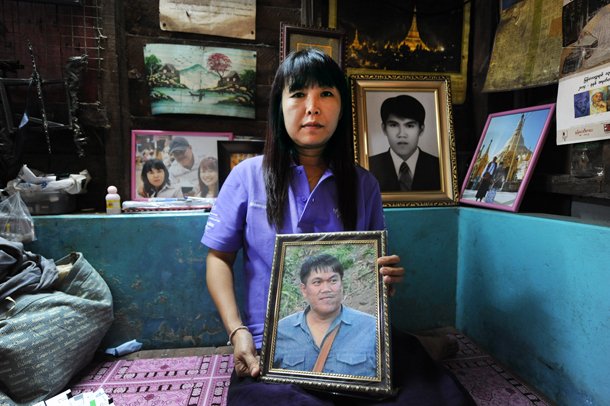The Myanmar National Human Rights Commission (MNHRC) once again proved the futility of its existence with a deeply unsatisfactory investigation into the murder of journalist Aung Kyaw Naing, a.k.a. Ko Par Gyi by the Burma Army.
By Burma Partnership | December 9, 2014
The Myanmar National Human Rights Commission (MNHRC) once again proved the futility of its existence with a deeply unsatisfactory investigation into the murder of journalist Aung Kyaw Naing, a.k.a. Ko Par Gyi by the Burma Army. Rather than providing meaningful avenues for redress for the victim and his family, the investigation report serves to act as a cover for the Burma Army, which is continuing to commit such human rights abuses throughout Burma’s ethnic areas.
Ko Par Gyi was a freelance journalist covering the conflict between the Democratic Karen Benevolent Army (DKBA) and the Burma Army when he was taken into military custody. Five days later he was tortured before being shot to death. The marks of torture were obvious to Ma Thandar, Ko Par Gyi’s wife, when she viewed the dead body. After calls from human rights groups as well as the US State Department, for an independent investigation, President Thein Sein consequently asked the MNHRC to conduct an investigation, the results of which were released on 2 December 2014.
The MNRHC investigation report, however, does not address the key issues surrounding this case, is full of inconsistencies, and does not include key pieces of evidence. It does not provide any explanation of the signs of torture that were clear on his body. The report claims that there had been a fight in which the gun had gone off; however, according to forensic experts that Ko Par Gyi’s wife has spoken to, he had been shot five times, one of which was point blank through the chin, implying that he had been shot four times before being killed.
Furthermore, the report claims that it cannot be concluded whether or not he was a member of the Klohtoobaw Karen Organization (KKO), the political wing of the DKBA, but this has been refuted by his family, the DKBA itself, and his journalist colleagues in the local area and in Rangoon. Furthermore ten out of 16 pages of the report were dedicated to the fighting itself rather than details of the case. As Ma Thandar points out, “Only on the last page of the report does it mention that citizens’ rights, as provided for by the Constitution, should be protected. It barely mentioned human rights.” This is a damning indictment of a national human rights institution. It should not matter whether or not Ko Par Gyi was a member of the KKO. The point is that he was brutally tortured and murdered while in military custody. The Burma Army should not be able to do this, whether a member of an armed group or not.
The lawyers and family of Ko Par Gyi have been dealt another injustice with the release of this report. They are not alone in experiencing further grief and pain due to the actions or inactions of the MNHRC. A statement released by ‘The Ja Seng Ing Truth Finding Committee’ explains about a case in Kachin State in September 2012. Burma Army soldiers indiscriminately fired into houses at close range in a village in Hpakant Township, killing a 14 year old schoolgirl, Ja Seng Ing. Her father, Brang Shawng, wrote a letter to both Thein Sein and the MNHRC, asking for an investigation to find justice for his dead daughter. Not only did the MNHRC not investigate the case, but the Burma Army is charging Brang Shawng for false accusations based on his letter to the MNHRC.
The MNHRC has proved to be ineffective while serving to pile more misery on the victims and families of victims of severe human rights violations. It is acting as a tool to cover the atrocities that are committed by the Burma Army on a systematic level. Robert San Aung, the lawyer for Ko Par Gyi’s family, put it succinctly and tellingly, “We ask the President to have an independent body look at this case.” The MNRHC is simply not trusted. Until the MNHRC proves its worth by conducting a rigorous and independent investigation into actions taken by the Burma Army or any state authorities, it will continue to exacerbate human rights problems rather than protect human rights as it is supposed to. The MNHRC must begin to adhere to international standards for national human rights institutions, such as the Paris Principles, and gain trust from the people by taking an independent stance and standing up to the state authorities. Otherwise, its credibility and legitimacy will be permanently damaged by such flawed investigations as seen in the case of Ko Par Gyi.
Information Source : www.burmapartnership.org
Organisation/s Involved
Burma Partnership


